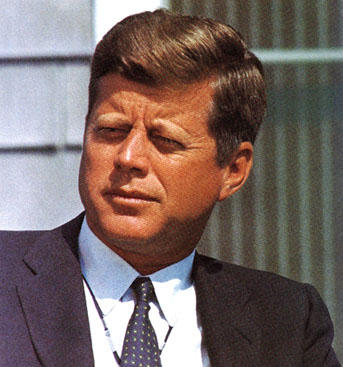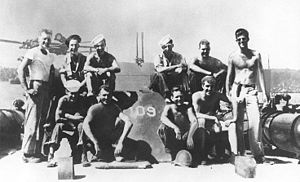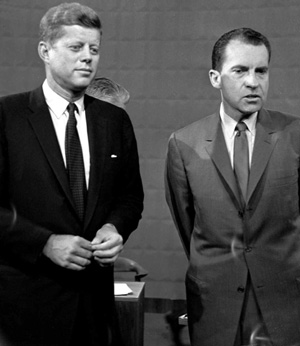

John Fitzgerald "Jack" Kennedy (May 29, 1917-November 22, 1963)John Fitzgerald Kennedy was America's 35th president, and holds a unique place in American political history. The grandson of a Boston Mayor, the son of a wealthy Ambassador, a genuine war hero, a Pulitzer Prize-winning author, and a leader whose full potential will never be known due to assassination. John Kennedy, nicknamed "Jack," was born into a rich, socialite lifestyle, surrounded by family members for whom politics was as natural as mother's milk, Kennedy inherited the mantle of the Kennedy clan's political hope upon the death of his oldest brother, Joseph Jr., who died in action during World War Two. Joseph was the Kennedy son being groomed for national greatness by their father, Ambassador Joseph Kennedy. When Joe Jr. died, Jack became the next in line to achieve greatness.
A Harvard graduate who enlisted in the Navy prior to the Japanese attack on Pearl Harbor, John Kennedy was working in the War Department in Washington D.C. when the Japanese attacked in December, 1941. He soon transferred to the Naval Reserve Officer Training Corps and Motor Torpedo Boat Squadron Training Center, after which he was given command of PT-109, a torpedo-armed patrol boat designed to operate among the islands of the South Pacific. On August 2, 1943, near the island of New Georgia in the Solomon Islands, PT-109 was rammed by the Japanese destroyer Amagiri, and split apart with the impact. Kennedy and his men, some of whom were wounded, including Kennedy himself, decided to forego the possibility of surrender and swam to a nearby island. For this action, Kennedy was awarded the Navy and Marine Corps Medal as well as a Purple Cross. This action turned Kennedy into a genuine war hero, a status that served him well after the war when he first ran for elected office, and, of course, when he ran for the presidency.

John Kennedy (on the right, shirtless) and the crew of PT-109 in 1943
In 1946, a year after the war ended, John Kennedy (and many other newly-minted veterans such as Richard Nixon), ran for the U. S. House of Representatives as a Democrat, easily defeating his Republican opponent. From this point, Kennedy's political fortunes continued to rise, and in 1952, Kennedy won a seat in the U.S. Senate. In 1956, he nearly became his party's Vice-Presidential nominee. His increased name recognition and his father's powerful political machine helped propel the still relatively young Kennedy to the White House, defeating incumbent Vice-President Richard Nixon in the 1960 presidential election. The 1960 election was the closest in history up to that point. One unique aspect to the 1960 elections, is that it featured the first-ever televised presidential debates.

John Kennedy and Richard Nixon in the 1960 Presidential Debates
Kennedy's inauguration as president took place in January, 1961, and Kennedy's inaugural address is considered one of the most memorable in history, with his call to "And so, my fellow Americans: ask not what your country can do for you—ask what you can do for your country."
Video of John Kennedy's Inaugural Address The Kennedy administration's primary foreign policy issues dealt with the various aspects of the Cold War with the Soviets and their fellow communist allies. Toward the end of the Eisenhower Administration, the island-nation of Cuba was taken over by a revolutionary leader named Fidel Castro. This new Cuban dictator swiftly allied himself with the Soviet Union. Over the decades, the United States would try many means to get rid of Fidel Castro, and the most public of these attempts was an invasion of Cuban exiles that would take place on the Cuban coast in an area called the Bay of Pigs. The invasion, suppported by the CIA, with the planning and initial preparation begun under President Eisenhower, was a disaster. Kennedy felt that he could not cancel this attempted overthrow of Castro, and when the exiles hit the beach at the Bay of Pigs, Castro's military forces were able to easily defeat them. This proved to be a major embarrassment for President Kennedy, and it caused Castro to turn to the Soviets for more help and protection.
In 1962, the United States discovered just how much protection the Soviets were willing to provide to their Latin American ally. Spy plan overflights enabled the U.S. to discover that the Soviets were putting nuclear missiles in Cuba, pointed at America. President Kennedy took action, declaring a blockade of Cuba to prevent Soviet ships from bring any more supplies to Cuba. Over the course of thirteen very tense days, this standoff between the world's two most powerful nations brought the world to the brink of an all-out nuclear war. This Cuban Missile Crisis ended with diplomacy, not war, and the Soviets withdrew their missiles from Cuba (and the U.S. withdrew some out-dated nuclear missiles from Turkey).
Another major foreign policy issue was the ongoing, and growing, war in Vietnam. President Eisenhower had first sent military advisors to aid the new South Vietnamese government in its struggle with communist rebels called Viet Cong and the Communist government of rival North Vietnam. By the end of the Kennedy Adminstration in 1963, the United States had 16,000 troops in Vietnam, most serving as "advisors" to the South Vietnamese military.
On November 22, 1963, President Kennedy and his wife travelled to Dallas, Texas for a political visit. Kennedy was preparing for his re-election campaign, and, despite having Texan Lyndon Johnson as his Vice-President, many voters in Texas were not fans of Kennedy or his policies. As his motorcade drove through Dallas, an assassin, later identified as Lee Harvey Oswald, fired several shots that killed President Kennedy. At his burial on November 25, 1963,
The Wars of John Kennedy:
Wars John Kennedy Took Part In:World War Two (1941-1945)American Wars and Conflicts of John Kennedy as Commander in Chief:
The Cold WarThe Berlin Crisis (1961)The Bay of Pigs (1961)
Cuban Missile Crisis (1962)
The Second Indochina War
The Vietnam WarThe Laotian Civil War
Personal Information on John Kennedy
Parents:Joseph P. Kennedy--FatherRose Fitzerald Kennedy--Mother
Siblings:
Joseph P. Kennedy, Jr (1915-1944)--Brother
Rose M. Kennedy (1918-2005)
Kathleen A. Kennedy (1920-1948)
Eunice M. Kennedy Shriver (1921-2009)
Patricia Kennedy (1924-2006)
Robert F. Kennedy (1925-1968)
Jean A. Kennedy (b. 1928)
Edward M. "Ted" Kennedy (1932-2009)
Spouse:
Jacqueline Bouvier Kennedy (m. 1953)
Children:
Arabella Kennedy (1956-stillborn)Caroline B. Kennedy (b. 1957)
John F Kennedy., Jr. (1960–1999)
Patrick B. Kennedy (1963-died two days after birth)
Religion:
Roman Catholic
Education:
1936-1940: Harvard University, BS in International Relations (cum laude)
Career/Occupation:
Author/Journalist/Politician
Books Written by John Kennedy:
While England Slept (1940)
Profiles in Courage (1955)-Won the Pulitzer Prize
A Nation of Immigrants (1964)
Military Service:
1941-1945--U.S. Navy. Kennedy served during World War Two, commanding to Patrol Torpedo boats in the Pacific Theater.Military Awards and Citations:
Purple HeartNavy and Marine Corps Medal
American Defense Service Medal
American Campaign Medal
Asiatic-Pacific Campaign Medal with three bronze service stars
World War II Victory Medal
Clubs and Organizations (membership):
Political Career:
Party Affiliation: Democrat
1946: Ran for the House of Representatives in Massachusetts (won).
1947-1953: Served as a member of the U.S. House of Representatives from Massachusetts's 11th district
1952: Ran for the U.S. Senate in the1952 election, defeating incumbent Republican Henry Cabot Lodge, Jr.
1953-1961: Served as a U.S. Senator representing Massachusetts.
1956: During the 1956 Democratic National Convention, Kennedy was nominated to be the running mate for presidential nominee Adlai Stevenson, but finished second in the balloting to Senator Estes Kefauver of Tennessee.
1960: Ran for President of the United States, defeating incumbent Vice-President Richard Nixon.
1961-1963: Served as the 35th President of the United States.
|
|
|
|
|
President |
John F. Kennedy |
1961–1963 |
|
Vice President |
Lyndon B. Johnson |
1961–1963 |
|
State |
Dean Rusk |
1961–1963 |
|
Treasury |
C. Douglas Dillon |
1961–1963 |
|
Defense |
Robert McNamara |
1961–1963 |
|
Justice |
Robert F. Kennedy |
1961–1963 |
|
Postmaster General |
J. Edward Day |
1961–1963 |
|
Postmaster General |
John A. Gronouski |
1963 |
|
Interior |
Stewart Udall |
1961–1963 |
|
Agriculture |
Orville Freeman |
1961–1963 |
|
Commerce |
Luther H. Hodges |
1961–1963 |
|
Labor |
Arthur Goldberg |
1961–1962 |
|
Labor |
W. Willard Wirtz |
1962–1963 |
|
Health, Education, and Welfare |
Abraham A. Ribicoff |
1961–1962 |
|
Health, Education, and Welfare |
Anthony J. Celebrezze |
1962–1963 |
Copyright © 1998-2015 History Guy Media; Last Modified: 07.19.15
"The History Guy" is a Registered Trademark.